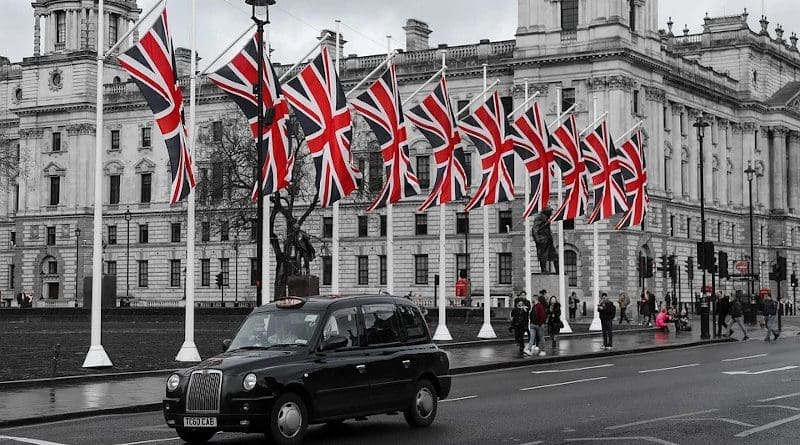UK Foreign Policy Needs A Strategy, Not Slogans – OpEd
By Arab News
By Andrew Hammond*
Former Conservative Foreign Secretary Douglas Hurd asserted in the 1990s that the UK had been able to “punch above its weight” in the post-war era, despite it no longer being a great power. That statement may have been true during much of the decades since, too, but is under increasing scrutiny in the 2020s.
That is part of the reason why the UK government released this week a refreshed foreign policy strategy for the “new” era of international relations heralded by Russia’s invasion of Ukraine. There are multiple developments to welcome in the document. However, it does not answer a number of growing questions concerning capability gaps that weaken UK national defense and undermine the UK’s NATO contribution.
To be fair to the Rishi Sunak government, many of these questions have plagued previous Conservative administrations over the past 13 years. In 2016, for instance, Gen. Sir Richard Shirreff, who had been the UK’s top commander in NATO, said that London’s failure to act more prominently on the world stage has helped turned the nation into a “bit player” with “nobody taking any notice of (then-Prime Minister David Cameron risking) foreign policy irrelevance.”
Looking back further in history, the challenges faced by Conservative governments in the 2010s and 2020s indicate that more than six decades after former US Secretary of State Dean Acheson famously said that the UK had lost an empire but not yet found a new world role, policy is in drift again. So the issue of UK grand strategy is a pressing, important one in 2023, and not just because of Russia’s Ukraine invasion.
Acheson made his remarks around the time of London’s first application to join the then-European Community in 1962. In the more than half century that followed, the nation did find a new post-empire role, with a strong, influential international voice, powered through twin alliances with Europe and the US.
However, challenges are now mounting again. Moreover, the UK government mantra of “Global Britain” is more of a slogan rather than a meaningful strategy for the UK’s future. For years, multiple UK governments have failed to articulate a grand strategy, offering instead policies, plans and political direction with budget the driver of strategy, not the other way round.
In the past decade, in particular, this is widely seen to have resulted in foreign policy “drift.” With the Ukraine war a potential hinge-point in world affairs, there is an urgent need for greater strategic clarity with several key areas of focus.
As the refreshed document released this week indicates, a top priority should be the UK’s posture toward China and Russia. Both are key nations and engagement will be needed.
Another key question is how productive the UK’s post-Brexit relationship will now be with Brussels and the EU-27, especially with the agreement of the new Northern Ireland protocol. While this and the UK’s 2019 EU withdrawal deal, and the 2020 UK-EU Trade and Cooperation agreement, have given some definition to future ties, there is still much to be decided.
Also vital is the UK’s future relationship with the US with Atlanticist Joe Biden. Some UK policy makers harbor concerns about the UK’s enduring value to Washington now that it can no longer play as effectively the role of what Tony Blair called the “bridge” between Europe and the US.
One of the biggest questions is how much emphasis to put on geographies such as the Asia-Pacific region versus redoubling of the Euro-Atlantic posture following Russia’s invasion. As the review highlights, NATO, the EU and Europe as a geopolitical space will be granted central places given that the UK’s No. 1 strategic aim remains the prosperity, stability and security of the continent which, as Winston Churchill said, is where the UK’s political “weather comes from.”
Second, the UK has evolved in the post-war period into a European regional power. This is not to deny that London remains a very significant player on the world stage, as a permanent member of key forums such as the UN Security Council, which wields considerable military, economic and soft power to boot.
One of the mistakes pro-Europeans made in the 2016 Brexit referendum was a failure to better connect a sense of the UK’s importance and uniqueness to its continued membership of the EU, which can amplify these strengths. Moreover, arguments that the UK should behave more like an “ordinary” nation overlook its history as a world power, and politicians who talk down one’s country often suffer a public backlash.
At the same time, some have overplayed the UK’s strengths, significant as these remain. Talk of the UK unlocking a new era of global trade in the 2020s has been muted by the reality of the UK’s bargaining power in a world shaped by global economic superpowers including the US and China.
Ultimately, these are not just a burning issue for the UK, but also for the rest of the world. For a UK that no longer punches so strongly on the international stage is also less able to bolster international security and economic prosperity at a time when, in the 2020s, both remain fragile.
• Andrew Hammond is an associate at LSE IDEAS at the London School of Economics.

